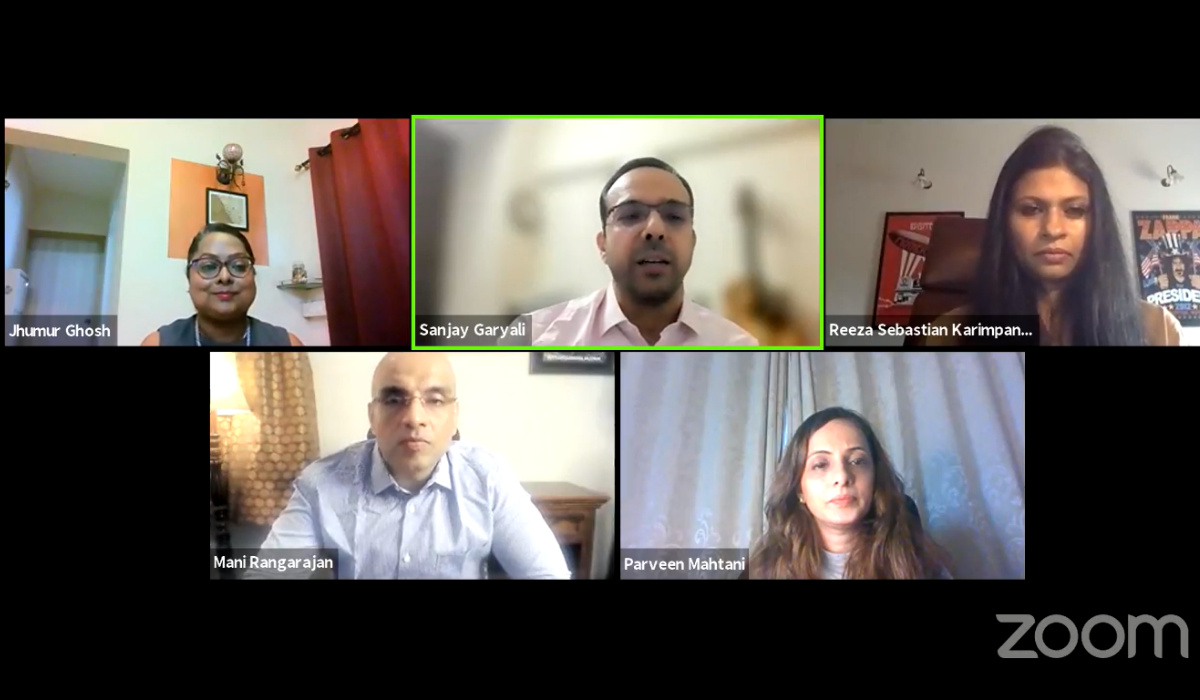In the real estate sector, women have traditionally been perceived as influencers and not decision makers in the home-buying journey. However, the pandemic has made people realise the value of owning a home, over other savings and investment channels such as gold, mutual funds and bank savings. So, is this trend visible among female investors too? Is the sector ready to cater to this category of buyers? To discuss it in detail, Housing.com conducted a webinar on the topic ‘Are women home buyers turning into a strong TG for the real estate sector?’ The panelists included Parveen Mahtani (chief legal officer, Mahindra Lifespaces), Reeza Sebastian Karimpanal (president-residential business, Embassy Group), Sanjay Garyali (business head – housing finance and emerging market mortgages, Kotak Mahindra Bank) and Mani Rangarajan, (group COO, Housing.com, Proptiger.com and Makaan.com). The session was moderated by Jhumur Ghosh (editor-in-chief, Housing.com News) and co-branded by Kotak Mahindra Bank.
Importance of owning a home for women
Even though real estate purchase decisions and the industry have always been male-dominated, the transition of women, from being influencers to key decision-makers when it comes to home buying, is very evident. According to Sebastian, “Women are now more open to diversifying their portfolios. Moreover, the new regulatory regime brought in by the Real Estate (Regulation and Development) Act (RERA), has been a key driver of this interest of women buying homes.” She further added that women are more progressive and risk-oriented and enjoy equal positioning with men today. The shift in financial investment approach from gold or fixed deposits, to real estate, gives a greater sense of stability to women, as it gives them the opportunity to earn returns in the form of capital appreciation and rental income. In addition to this, Sebastian maintained that the low home loan interest rates, deals and offers from developers and affordability, were fuelling the interest of women in home-buying.
On the other hand, Mahtani said that the ‘work-from-home’ routine has allowed women to continue to work, without having to choose between one’s career and family. Therefore, women are increasingly thinking about stability, security, independence and having a safe place. Moreover, due to the COVID-19 pandemic, with working men and children staying back at home, women now have more responsibilities. This is one of the main reasons why joint ownership of homes is making a strong comeback, she added.
On the home finance front, Garyali said that around 45%-50% people were opting for home loans, for buying their first house. He further added that women were a significant part of it, helping to improve loan eligibility. Moreover, women are also actively participating in deciding their home requirements such as location, size, etc., he said.
While discussing the property search trends, Rangarajan said that on Housing.com, a very strong growth had been seen in the women audience, who contributed around 35%-40% of searches. He said, “In January 2020, on Proptiger.com, only 22%-23% of the total purchases were made by women. However, post-pandemic, around 30% of home buyers are females.” Rangarajan also reiterated the point that women home buyers preferred larger size homes and in varied price brackets. Around 30% of women sought homes of more than Rs 1 crore, about 50% in the price range of Rs 50 lakhs to Rs 1 crore and the remaining 20% in the sub-Rs 50 lakhs range.
Factors boosting women’s interest in home buying
While talking about the factors that have contributed to the paradigm shift towards buying a home in the name of women, Ghosh mentioned that this transition was not just a financial phenomenon but also a cultural and social shift. Similarly, Sebastian pointed out that women increasingly considered home buying as a medium of their empowerment, independence and success. Talking about the financial incentives, she further added that lower interest rates, discounted pricing and the current market conditions, were pushing females towards home buying. According to her, around 70% of the total purchases in the current market scenario were being driven by women. From an investment point of view, Sebastian also said that women could consider diversifying their investment in real estate, by putting money in real estate investment trusts (REITs) as 90% of the income is distributed among the investors and it pays higher dividends than any other listed stock.
Adding to this, Mahtani said that the government’s incentives had worked as sweeteners but it was not the fundamental reason why women were opting for home buying. “Home buying is more about security and diversifying the investment portfolio. It is important to note that there are other benefits of home buying, like capital appreciation and rental income which can be used as a safety net after retirement,” she added. Higher disposable income, multiple tax and fiscal benefits make this an ideal time for home buying, she maintained.
Taking the discussion further, Garyali said that people buying for ‘self-use’ do not need sweeteners, as they look for more fundamental benefits such as tax rebates, home loan eligibility, etc. People who are making a real estate purchase for investment purposes, look at incentives such as low home loan interest rate, discounts, tax benefits, etc. Moreover, the ease of getting liquidity from real estate, makes it an attractive proposition for women. He further added that since women were generally more risk-averse, real estate was a comfortable investment for them, as the RERA had brought down the market risk in the sector to zero.
Adding to this, Rangarajan said that 50% of the women buyers were between the 25-35 age group and were very progressive and risk-oriented when it came to financial independence. Real estate ownership gives them stability and a sense of security, in terms of the returns they get from it, he pointed out.
Real estate vs other investment options
Ghosh mentioned that since end-users were also thinking from an investment perspective, it was important to discuss how real estate compared to other investment options. To this, Rangarajan revealed that in the past two consumer sentiment surveys conducted by Housing.com, around 42% of the audience preferred real estate investment, as compared to gold, stocks or mutual funds. Moreover, in contrast to predictions made by real estate pundits in 2020, real estate had not eroded in value and was not subject to the kind of volatility witnessed in gold or stocks. Apart from this, the rental income and capital appreciation of the real estate asset, served as twin benefits to investors.
Profiling women home buyers
During the webinar, the conversation also covered the demographic details of women home buyers. According to Sebastian, “Mostly it is the married women where husbands are encouraging their wives to put their name on the papers. While married women prefer staying in close vicinity to the workplace, with social infrastructure, etc, single women are now more open to exploring suburban locations where integrated townships have come up. These have community-living aspects and walk-to-work concepts with all amenities inside the township.”
Explaining how a woman home buyer was different from the male counterpart, Garyali said that in any family, the roles are clearly divided. The man is usually more concerned about the financial aspect, while a woman is more concerned about the ecosystem. “Women home buyers are extremely credible, more disciplined in their finances and avoid unnecessary risks. This is the reason why most of the banks have different rates of interest for women. Moreover, data shows that women have better and higher CIBIL scores, which shows that their credit history is really sound,” Garyali said.
In terms of single women buying homes, it was mostly happening close to their existing place or parents’ homes or in the same building where independent homes were being set up by the parents for their daughters, the panellists said.
Home loan finance for women home buyers
On one hand, where a working woman could easily get bank finance for buying a home, there have always been doubts if a housewife could get a home loan. According to Garyali, “Housewives can get a home loan, provided they have some kind of capability or income for paying back the loan. Usually, housewives have income-generating investments or income-earning co-applicants.”
Talking about home loan interest rates, he added that as the Reserve Bank of India (RBI) did not expect inflation to increase, rates may remain stable for the next few months. He further said that as the present real estate prices were quite realistic, home loan interest rates were rarely a deciding factor.
See also: Best banks for home loans for women
Checklist for women home buyers
Mahtani shared some important points that women buyers should mandatorily follow, while buying a home:
- Before buying a home, check the project’s registration and the builder’s credentials, past projects, quarterly results, project title and progress on RERA.
- Check the possession date mentioned on the RERA portal and make sure it is in-coherence with the sale agreement.
- As stamp duty differs from state to state, ascertain the amount that you will have to shell out, which will depend on the ready reckoner/guidance value/circle rate and also on market rate, whichever is higher.
- Make sure that you and your co-applicant can afford the property you are investing in.
- Build your credit score, to improve your home loan eligibility.
- Check for government relaxations, such as PMAY subsidy, tax benefits and incentives.
- Make sure you plan for an emergency fund, as home buying is a long cycle and you would have to invest a large capital.
Real estate marketing needs better strategy to target female buyers
As it is evident, real estate marketing and advertising currently tend to focus on men. The market needs to understand that men and women approach real estate purchase decisions with very different motives, perspectives and considerations. However, this does not get addressed in advertising.
According to Sebastian, “This is because most of the companies are headed by men and there is a chance of bias in communication. Women are far more responsive to emotional advertising. The teams need to be more gender-inclusive, to reach out to women home buyers.”
Rangarajan further added that at Proptiger.com, it was always ensured that we meet the family before the purchase is completed. “We have data to substantiate the fact that when a woman is involved in decision making and fully supports the purchase, the cancellation rates tend to be far lower,” he elaborated.
In the home finance sector, Garyali pointed out that gender diversification at the workplace was very important, in a way that customers noticed it. Moreover, real estate needed to be clutter-free and more digital, where terminologies do not end up confusing the women home buyers, he concluded.
Surbhi is an experienced content marketing expert for over nine years now and has contributed articles and research insights for top real estate portals. She is a journalism graduate and has keen interest in politics, urban development and infrastructure studies. Surbhi is a bookworm and delves into historical fiction and inspiring biographies when she is not sleeping.
Facebook: https://www.facebook.com/surbhi.gupta2406/
Twitter: https://twitter.com/surbhi2406
Linkedin: https://www.linkedin.com/in/surbhi-gupta-82159b63/
Quora: https://www.quora.com/profile/Surbhi-Gupta-17
about.me: about.me/surbhi.gupta/












